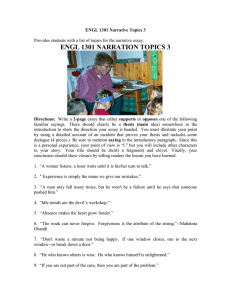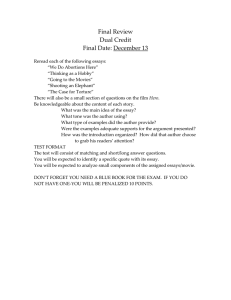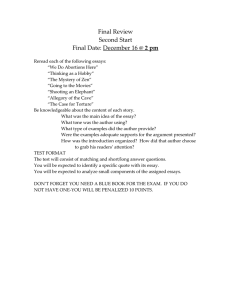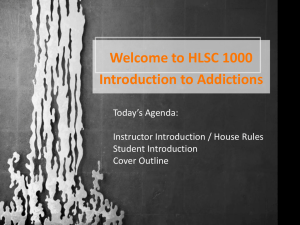ENGL 1301.007 Composition I Syllabus – Spring 2016 Instructor: Phone:
advertisement
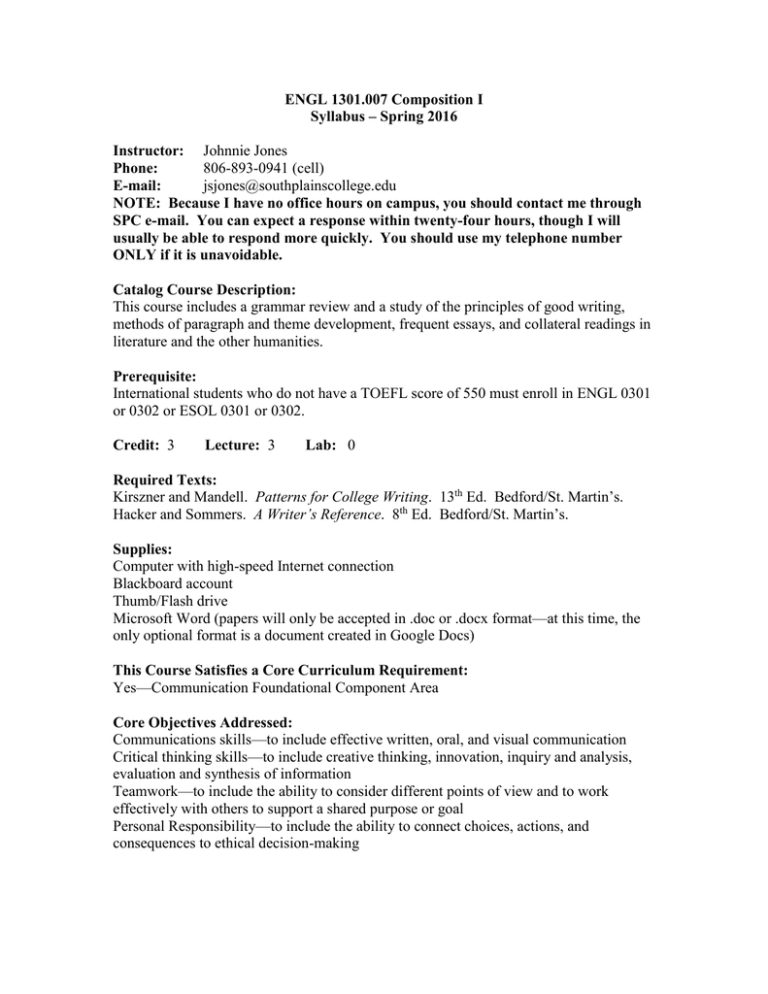
ENGL 1301.007 Composition I Syllabus – Spring 2016 Instructor: Johnnie Jones Phone: 806-893-0941 (cell) E-mail: jsjones@southplainscollege.edu NOTE: Because I have no office hours on campus, you should contact me through SPC e-mail. You can expect a response within twenty-four hours, though I will usually be able to respond more quickly. You should use my telephone number ONLY if it is unavoidable. Catalog Course Description: This course includes a grammar review and a study of the principles of good writing, methods of paragraph and theme development, frequent essays, and collateral readings in literature and the other humanities. Prerequisite: International students who do not have a TOEFL score of 550 must enroll in ENGL 0301 or 0302 or ESOL 0301 or 0302. Credit: 3 Lecture: 3 Lab: 0 Required Texts: Kirszner and Mandell. Patterns for College Writing. 13th Ed. Bedford/St. Martin’s. Hacker and Sommers. A Writer’s Reference. 8th Ed. Bedford/St. Martin’s. Supplies: Computer with high-speed Internet connection Blackboard account Thumb/Flash drive Microsoft Word (papers will only be accepted in .doc or .docx format—at this time, the only optional format is a document created in Google Docs) This Course Satisfies a Core Curriculum Requirement: Yes—Communication Foundational Component Area Core Objectives Addressed: Communications skills—to include effective written, oral, and visual communication Critical thinking skills—to include creative thinking, innovation, inquiry and analysis, evaluation and synthesis of information Teamwork—to include the ability to consider different points of view and to work effectively with others to support a shared purpose or goal Personal Responsibility—to include the ability to connect choices, actions, and consequences to ethical decision-making ENGL 1301—Jones-2 Course Purpose: The purpose of ENGL 1301 is to help students understand and apply the standards of correctness in formal thought and the written English language. English 1301 helps students to think well by teaching them to read and write well through its focus on the writing process, the use of appropriate grammar and diction, the use of logic, and the different methods of essay development. Various readings from all areas of the humanities are included. Requirements: 1. Students will write a minimum of six essays including the final exam. 2. Students will read short stories, poems, and essays, participate in class discussions of the readings, and complete tests over their understanding of the readings through quizzes, examinations, discussion posts, and/or written assignments. 3. Students may write additional assignments including, but not limited to, resumes, business letters, homework or reaction papers, and journal entries. 4. Students will take quizzes and examinations covering, but not limited to, grammar, reading assignments, logic, and rhetorical modes. Student Learning Outcomes: Upon completing the course, the student will show competence in these objectives: 1. Understand that writing is an interactive process that includes prewriting, writing, and revision, and apply those principles to all assignments/papers. 2. Develop a paper in an appropriate and logical order/structure/mode. 3. Use revision to rectify structural, unity/focus, developmental, grammatical, or mechanical issues within a paper. 4. Analyze and appreciate professional writers’ work by understanding its message, how it communicates, and how it impacts the reader. 5. Apply the principles of the writing process in tailoring sentence structure, tone, diction, overall style, and mode to fit both the assignment and audience in order to promote coherence and effective communication. 6. Apply the principles of logic to the writing in order to make its communication more efficient, coherent, and powerful. 7. Apply the principles of unity and coherence in order to help the writing be focused and promote more effective communication. 8. Apply the principle of parallelism in order to make the writing more coherent, logical, easily read and understood, and structured. 9. Write an essay in standard English (the criteria being those described in the current required handbook) in order to follow the writing process regarding the style requirements of academic writing. 10. Understand and apply the grammatical and mechanical elements of writing in order to promote effective and powerful communication. 11. Be able to analyze a student’s own work or a classmate’s work and to determine if revisions are needed for the work to fit the assignment, be better developed, or communicate more effectively, and then to convey this in writing to the student. 12. Make constructive suggestions for others’ work during peer editing or other ENGL 1301—Jones-3 critiques or presentations. 13. Do group work by working with other members of the class in order to complete the assignment by contributing to the project while interacting with other members of the group in order to do so. Course Requirements and Policies: 1. Be on time and regularly attend class. 2. Be responsible for the learning process, including preparation for class such as reading and homework; participate in class discussions including asking relevant questions; collect assignments and/or notes if absent; and accept responsibility for not understanding an assignment or failing an assignment. 3. Be responsible for having an appropriate attitude and for using appropriate language for an academic environment; avoid condescending, inflammatory, or profane rhetoric whether verbal or written. 4. Maintain respectful behavior toward instructor and classmates in order to contribute to the atmosphere necessary for learning. 5. Act courteously to others especially by not becoming a distraction in class. When class begins, all cell phones/hand-held devices must be turned off and set off the desk. All laptop computers should be closed unless you are instructed to use them. Using your phone or computer during class in an unauthorized manner will result in your being asked to leave, and it will count as an absence. If you are late to class, leave the classroom before the allotted break time, or do not return within the allotted time, you will be counted tardy. Two tardies will count as one absence. As stated, students will be dropped after two absences. Do not count on a nightly break. 6. Be responsible for tracking your grades and applying them to the grading scale used for the class, which is shown in the course syllabus. Grades will be accessible on Blackboard. 7. Submit all assignments in accordance with due dates, formats, and requirements. All work is due when or before class begins whether you are present or absent. 8. Avoid all forms of cheating and plagiarism on all assignments including improper collaboration. 9. Ask a question when something is unclear. Outcomes Inventory: A pre- and/or post-test may be used to determine the extent of improvement that students have gained during the semester; the tests will be given at either the discretion of the instructor or departmentally assigned. Grading Policy: Tests/Essays Homework/Quizzes/Discussions Grading Scale: A/90-100 70% 30% Superior ENGL 1301—Jones-4 B/80-89 C/70-79 D/60-69 F/below 60 Good Average Poor Unacceptable Essays and writing assignments will be evaluated according to the following criteria: 1. Use of the conventions of standard grammar; 2. Use of the appropriate method of development for the assignment; 3. Use of the principles of unity and coherence; and 4. Use of logical, factual arguments to advance the thesis of the assignment. All assignments must be completed and turned in on (or prior to) the date due before a student will receive credit. The official “due date” is when class begins. Failure to turn in any assignment will result in a student scoring an F for the semester. Homework and Quizzes: Homework will be assigned each class period. Students with questions regarding homework should see me before or after class and may make an appointment. Reading quizzes will be given at the beginning of each class period; reading the assigned homework is crucial to success. Students are responsible for all assignments, whether in attendance or not at the time the assignments are made. When you miss class, you must make arrangements to take quizzes and tests with me. Caution: if any single assignment is not submitted, a student’s final grade will automatically be F. Attendance Policy: Students must attend class and should arrive on time. Sometimes tardiness is unavoidable; however, continued tardiness will result in the instructor’s request to drop the class. Any student who misses more than two class sessions may be dropped with a grade of X if the student has a passing grade average at that time. If the student is failing, due to poor work or missing assignments, the student will be dropped with a grade of F. A student who misses more than the allowed number of absences with no acceptable excuse to the instructor should plan to drop him/herself. Do not assume that the instructor will automatically do so. In special cases because of extenuating circumstances, a student may have more than two absences and not be dropped, but the student must immediately notify the instructor of the attendance difficulty and submit proof of those extenuating circumstances, especially if the student has already reached the two allowed absences. This is a college course; late work will not receive a grade, and yet you must still submit it. Attendance is critical to success in the course. “Whenever absences become excessive, and, in the instructor’s opinion, minimum course objectives cannot be met due to absences, the student will be withdrawn from the course” (SPC General Catalog 20). Academic Integrity—Plagiarism and Cheating: “It is the aim of the faculty of South Plains College to foster a spirit of complete honesty and a high standard of integrity. The attempt of any student to present as his or her own any work which he or she has not honestly performed is regarded by the faculty and ENGL 1301—Jones-5 administration as a most serious offense and renders the offender liable to serious consequences, possibly suspension” (SPC General Catalog, p. 23). "Complete honesty is required of the student in the presentation of any and all phases of course work. This applies to quizzes of whatever length as well as to final examinations, to daily reports and to term papers" (SPC General Catalog, p. 23). Students should consult the General Catalog on p. 23 for the college's detailed policies on plagiarism and cheating. Failure to comply with these policies will result in an F for the assignment and can result in an F for the course if circumstances warrant. Students with Disabilities: Students with disabilities, including but not limited to physical, psychiatric, or learning disabilities, who wish to request accommodations in this class should notify the Special Services Office early in the semester so that the appropriate arrangements may be made. In accordance with federal law, a student requesting accommodations must provide acceptable documentation of his/her disability to the Special Services Coordinator. For more information, call or visit the Special Services Office in the Student Services Building, 806-716-2529 or the Counseling Center at 806-716-2366. Statement of Nondiscrimination: It is the policy of this instructor not to discriminate on the basis of age, color, disability, ethnicity, gender, national origin, race, religion, sexual orientation, or veteran status. Statement of Diversity: In this class, the instructor will establish and support an environment that values and nurtures individual and group differences and encourages engagement and interaction. Understanding and respecting multiple experiences and perspectives will serve to challenge and stimulate all of us to learn about others, about the larger world, and about ourselves. By promoting diversity and intellectual exchange, we will not only mirror society as it is, but also model society as it should and can be. CAUTION: English 1301 is a freshman-level college course for which the SPC English department determines the content. Some readings contain adult language and subject matter. Students who are not yet ready for mature, college-level content should consider carefully before continuing with this course. Superior Essays (A) ENGL 1301—Jones-6 These essays meet all the conventions listed for Good Essays, but the work is more original, more inspired, and more maturely presented. An A essay should not contain more than one major grammatical error. Good Essays (B) Central Idea: presents a significant and interesting central idea, clearly defined and supported with substantial, concrete, and consistently relevant detail. Organization/Development: handled so that the essay conveys a sense of controlling purpose and orderly progression; the thought moves clearly, coherently, and with compelling logic toward a conclusion; paragraphs are developed with sufficient support and suitable proportion and emphasis; transitions between paragraphs are explicit and graceful. Sentence Structure: skillfully constructed and displaying fluency, economy, and effective variety; together with diction, sentence structure is the best evidence of style— the distinctive, natural display of a good mind at work. Diction: everywhere appropriate to the writer’s subject, purpose, audience, and occasion; distinctive in precision, economy, and the idiomatic use of General English. Mechanics: notable for the consistent use of conventional General English grammar, punctuation, and spelling; any errors are minor and do not detract significantly from the generally high quality of the essay as a whole. If the content and development are particularly good, an essay may receive a “B” with two major grammatical errors. Average Essays (C) Central Idea: is apparent but may be trite, general, or self-evident; the idea is supported with some concrete detail, but detail that is occasionally repetitious, irrelevant, or sketchy. Organization/Development: plan and method of the essay apparent but not consistently fulfilled; developed with occasional disproportion or inappropriate emphasis; paragraphs unified, coherent, and usually effective in development; transitions between paragraphs clear but sometimes abrupt, mechanical, or monotonous. Sentence Structure: most sentences correctly structured but lacking in variety, economy, or forcefulness. Diction: appropriate to the subject, purpose, audience, and occasion; generally clear and idiomatic but not distinctive; some misuse of words may occur. Mechanics: clarity and effectiveness of expression are weakened by occasional lapses from conventional General English grammar, punctuation, and spelling. An essay cannot get above a “C” if it contains three major grammatical errors. **Please Note: In college, a “C” is an average paper; it does not have anything “wrong” with it; it fulfills the assignment; it simply does not reach beyond the average. Poor Essays (D) Central Idea: is vague or confused or too large or general; unsupported by specific, concrete, relevant detail. Organization/Development: plan and purpose of the essay are not apparent; either the generalizations are left undeveloped, or they are developed by detail that is irrelevant, or inconsistent; paragraphs lack unity, coherence, or support; if there are any transitions ENGL 1301—Jones-7 between paragraphs, they may be unclear, misleading, or ineffective; thought and planning may display illogic or insufficient effort. Sentence Structure: sentences lacking in unity or coherence; run-ons, comma splices, or fragments may exist; expression is generally marked by serious and/or frequent awkwardness, incompleteness, ambiguity, redundancy, or immaturity; coordination may be excessive with a subsequent lack of appropriate subordination. Diction: inappropriate expression in being vague, imprecise, unidiomatic, immature, too colloquial, or substandard. Mechanics: clarity of meaning is obscured by frequent or serious departures from conventional General English grammar, punctuation, and spelling. Under no circumstances will a paper with more than four major grammatical errors receive more than a “D”. Unacceptable Essays (F) An essay fails when it lacks a central idea, when it is clear that the writer has no subject, purpose, or reason for writing, or if the writer has clearly not put forth an effort to complete the assignment to the best of his or her ability. An essay may also fail when it exhibits a total inability to develop its central idea or when it demonstrates incompetence in the use of conventional General English. Under no circumstances will an essay receive higher than an “F” if it contains five or more major grammatical errors, and an essay may receive an “F” with three major errors if the content and development are not particularly strong. No Essay (0) Any essay, or other assignment, not written and turned in receives a Zero and is averaged into the student’s grade as such. Except in special circumstances, teachers will not accept late work, so the assignment must be turned in on time, and teachers do not allow makeup assignments for work missed, or re-writes to improve the grade given. As in the world of work, the job must be done right the first time, and completed on time, or no credit is given. Important: Essays must be typed using MLA format: one-inch margins, Times New Roman, 12-pt font, font, double spaced format. Consult the Hacker text p. 393 and ff. for instructions and examples. An example of the required heading and first page appears on p. 465 of the Hacker text. Caution: All assignments/dates are subject to change. I will give adequate notification if changes occur. Students not in class when changes are announced remain responsible for gathering the information. ENGL 1301—Jones-8 Student Agreement: Your signature on this document indicates that you understand and agree to the details above. I have read this syllabus. I understand and accept all policies and procedures as described. Printed Name:___________________________________________________________ Location (campus):________________________________________________________ Signature:_______________________________________________________________ Date:________________________________Class:______________________________
